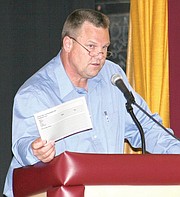Supporters, opponents turn out for Tester talk in Troy
Sen. Jon Tester was greeted Saturday morning by both supporters and critics of his proposed Forest Jobs and Recreation Act as he took his place behind the podium at the Troy High School auditorium.
“For decades forest policy and lawsuits have stopped forest management cold,” Tester told the crowd. “It’s clear that it’s time for a new direction. Montana folks working for a Montana solution is the best of all worlds.”
Tester stopped in Troy as part of a statewide tour to promote the bill, which was introduced in July.
Attendees quietly expressed their support or opposition Saturday through signs on their laps while Tester summarized the bill. A table in the back displayed a petition.
Tester told the crowd that the bill was conceived when three separate groups – the Three Rivers Challenge, Beaverhead-Deerlodge Partnership and Blackfoot Clearwater Stewardship Project – approached him with the same goal in mind. They envisioned the creation of a forest plan where timber harvest, recreation and wilderness could co-exist.
The 80-page bill affects the Three Rivers District of the Kootenai National Forest in the Yaak, the Beaverhead-Deerlodge National Forest and the Seeley Lake District of the Lolo National Forest.
The bill requires the U.S. Forest Service to harvest at least 30,000 acres in the Three Rivers District over 10 years and designate 30,000 acres of wilderness at Roderick Mountain. Recreation areas are also to be set aside in the district, separated into motorized and non-motorized areas.
Wayne Hirst spoke on behalf of the Three Rivers Challenge, lauding the timber harvest aspect of the bill, which he admitted was the only part that attracts his interest. He said that for 30 years Lincoln County residents fought over land use while mills closed and forests languished.
“We have sat here and watched logging die,” Hirst said. “… We need this kind of help if we want to save jobs.”
Some in attendance feared that if the bill passes, timber harvest could be tied up in court for years.
“Our main concern is that if they get the wilderness, the management won’t happen,” said attendee Gene Yahvah, a tree farmer in Heron.
Yahvah said more people would support the bill if a trigger mechanism existed to allow wilderness designation only after the timber harvest.
During his talk, Tester said, “If there was trigger language in there, we wouldn’t be able to put it through (Congress).”
Tester said that if the legislation passes, it would be the first time that Congress has ever mandated an acreage cut. He said that an act of Congress carries weight and that if a judge looked over the facts of the case, the decision would be a “no-brainer.”
Attendee Howard Bakke, president of the Cabinet Resource Group, agreed. He said the legislation is important to finally work to prevent an impending catastrophic fire.
“I think we’ve found a way to break the gridlock that’s been going on for so many years,” he said.
Tester sought input from stakeholders across the state and hosted listening sessions in Libby, Missoula, Deer Lodge and Townsend.
Critics, however, say that listening sessions were invitation-only and did not reflect the feeling of the majority.
“They’re not listening sessions, they’re telling sessions,” said State Sen. Aubyn Curtiss of Fortine. “I’m an elected official of this county and I was not invited.”
After Tester summarized the bill, he invited attendees to speak individually with him or his staff about their thoughts of the legislation, as well as to ask questions. He also asked them to fill out and turn in a card with their comments.
Curtiss criticized the method, saying that Tester did not hold a formal Q-and-A session with the microphone so that opposition would not “be on the record.”
Tester denied the accusation, stating that many more people had the opportunity to share their thoughts by speaking to either him or one of his five staff members, or filling out a card.
“I’m serious about getting input,” he said.



